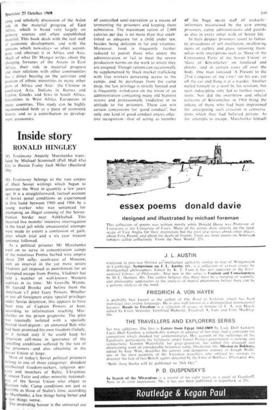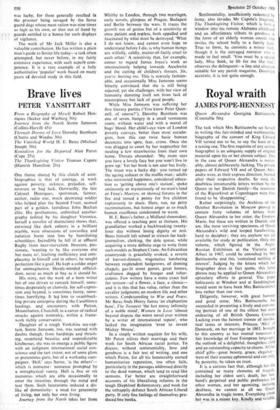Inside story
RONALD HINGLEY
My Testimony Anatoly Marchenko trans- lated by Michael Scammell (Pall Mall 45s) Life in Russia Today Jack Miller (Batsford 30s) My Testimony belongs to the vast corpus of illicit Soviet writings which began to penetrate the West in quantity a few years ago. It is a straightforward, factual account of Soviet penal conditions as experienced at first hand between 1960 and 1966 by a young worker who was sentenced for attempting an illegal crossing of the Soviet- Iranian border near Ashkhabad. This incurred five months' intensive interrogation in the local jail while unsuccessful attempts were made to extort a confession of guilt, after which trial and a six year treason sentence followed.
As a political prisoner Mr Marchenko went on to serve in concentration camps of the notorious Potma barbed wire empire about 250 miIes south-east of Moscow, with an interval in the yet more severe Vladimir jail imposed as punishment for an attempted escape from Potma. Vladimir has held a number of well-known Western captives in its time: Mr Greville Wynne. Mr Gerald Brooke and before them the American u2 pilot Gary Powers. Whether or not all foreigners enjoy special privileges under Soviet detention, this appears to have been true of Captain Powers at least, according to information reaching Mar- chenko on the prison grapevine. The pilot was reputedly isolated with a specially briefed stool-pigeon: an unnamed Balt who had been promised his own freedom (falsely, as it turned out) if he could keep his American cell-mate in ignorance of the appalling conditions suffered by the rest of the prisoners—and also obtaining in the Soviet Union at large.
Most of today's Soviet political prisoners helong to one of three categories: dissident ntellectual freedom-seekers, religious acti- sts and members of Baltic. Ukrainian. rimean Tatar and other minority nationali- les of the Soviet Union who object to ussian rule. Camp conditions are just as orrible as those of Stalin's time, according 0 Marchenko, a few things being better and few things worse.
The overriding horror is the universal use of controlled semi-starvation as a means of tormenting the prisoners and keeping them submissive. The maximum ration of 2,400 calories per day is no more than that estab- lished as adequate for a child under ten. besides being deficient in fat and vitamins. Moreover, food is frequently further reduced to punish those who annoy the administration or fail to meet the severe production norms on the work to which they are assigned. Though rations can occasionally be supplemented by black market tratlicking with free workers possessing access to the camps, and by purchases from the camp shop, the last privilege is strictly limited and is frequently withdrawn on the whim of an administration containing many old Stalinist screws and professionally vindictive in its attitude to the prisoners. These can win certain concessions for "good conduct', but only one kind of good conduct enjoys effec- tive recognition—that of acting as member
of the huge secret staff of stukachi:
informers maintained by the n among prisoners, camp administrators and guards. as also in every other walk of Soviet life.
In their despair prisoners resort to fantas- tic procedures of self-mutilation, swallowing items of cutlery and glass, tattooing them- selves with inscriptions such as 'Slave of the Communist Party of the Soviet Union' or 'slave of Khrushchev' on forehead and cheeks--and in certain cases all over the body. One man tattooed 'A Present to the 23rd Congress of the cl.su' on his ear, cut off the ear and flung it at a warder. Another nailed himself to a stool by his scrotum. but such indiscipline only led to further repres- sions. Nor did the overthrow and official criticism of Khrushchev in 1964 bring the release of those who had been imprisoned for anticipating such criticism in conversa- tions which they had believed private. As for attempts to escape. Marchenko himself
was lucky, for these generally resulted in the prisoner being savaged by the fierce guard dogs whose meat ration was nine times as high as his own, or shot out of hand by guards entitled to a bonus for such displays of vigilance.
The work of Mr Jack Miller is also a valuable contribution. He has written a plain man's guide to Soviet life today—a task often attempted, but never before, in my fairly extensive experience, with such superb com- petence. It is a rare example of a fully authoritative 'popular' work based on many years of devoted study in this field.



















































 Previous page
Previous page